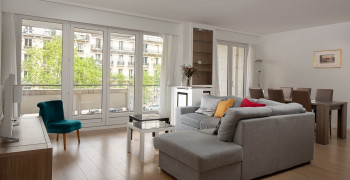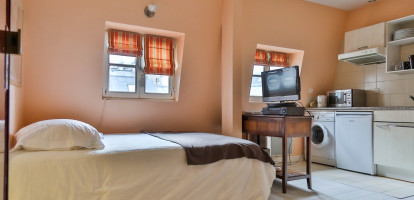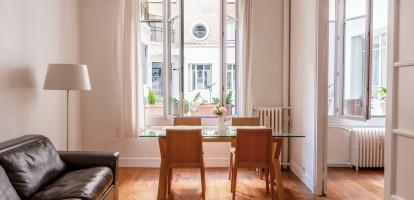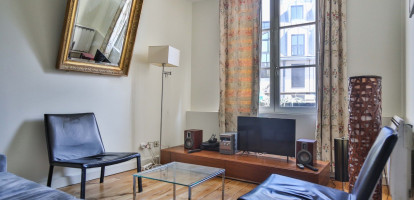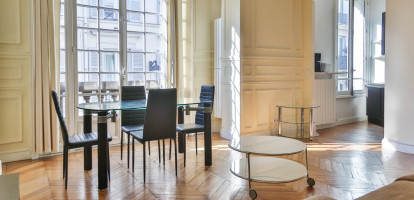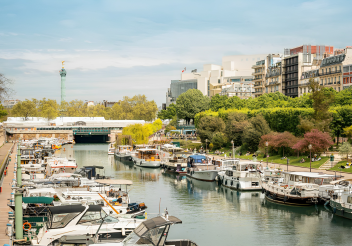If your retirement dream involves many cultural events, dining experiences, and captivating activities easily accessible, moving to Paris fits your vision perfectly. Indeed, Paris has become a highly sought-after retirement destination for expat retirees, particularly among Americans and British. According to the French statistics agency INSEE, about 30% of British expatriates in France are retirees, contributing to the total of 1.2 million retired immigrants residing in France as of 2021. This guide walks you through finding a long-term furnished apartment rental in Paris as an expat, ensuring a smooth transition into your retirement in France.
Is a Visa or Residency Card required to retire in France? Unless you are a citizen of a European Union (EU) or European Economic Area (EEA) country or the spouse/direct family member of an EU/EEA citizen, you do not possess an automatic right to relocate or retire in France. In such cases, applying for a visa and obtaining a residency card is necessary to establish legal residency in France.
However, retiring in France as a North American and British is generally achievable. Here are some necessary requirements for retiring in France:
Your passport should be signed and valid for at least three months beyond your planned stay.
Note: The EU officials have recently confirmed to SchengenVisaInfo that the go-live date for ETIAS has been postponed to May 2025.
2. Completed application forms:
Fill out the required application form(s) and sign them legibly.
3. Proof of income:
Demonstrate your financial means of support during retirement.
4. Medical insurance proof:
Provide evidence of medical insurance coverage while in France. For your information, Americans who have legally resided in France for more than three consecutive months and demonstrate their intent to become legal tax residents by spending at least 183 days per year in France may be eligible to apply for the national healthcare system, which can be a high advantage for retiring in France as an American. Once enrolled in the plan, the contribution amount is generally around 8% of their income, exceeding a specific threshold.
5. Proof of accommodation:
Show documentation confirming your accommodation arrangements in France.
6. Proof of legal status in North America:
If applicable, provide a copy of your legal status, such as a driving license or green card.
7. Letter of commitment:
Submit a letter stating that you will not seek employment in France.
8. Marriage certificate:
If applicable, include a marriage certificate as part of the application.
9. Travel arrangements:
Present an e-ticket or reservation record indicating your departure date to France.
10. Long-term residence form:
Complete, date, sign, and have the long-term residence form notarized.
*If any of the following apply to you, you will need an ETIAS Authorization:
- You are not a European Union national
- You are a citizen of any country, including the U.S., whose nationals currently do not require a visa for short-term stays in a European Union country
- You do not possess a residence permit or card issued by any of the European countries that require ETIAS
- Certain travelers may be exempted from the ETIAS travel authorization requirement, so it’s advisable to check before applying.
For American citizens traveling to Europe, the application process will be available on https://travel-europe.europa.eu/etias_en once it becomes operational.
What are the best neighborhoods in Paris to live in for retirees?
Paris has several neighborhoods considered ideal for expat retirees, especially Anglo-Saxons, due to their calm ambiance, amenities, and accessibility to various services. For example, the 6th, 7th, 16th, and 15th arrondissements and the approximate western suburbs of Neuilly sur Seine are perfect for expat retirees. Here are some of our recommendations:
Saint-Germain-des-Prés:
A literary and artistic hub, the Saint-Germain-des-Prés neighborhood offers a vibrant cultural scene with cafes, bookshops, art galleries, and theaters. It is well-connected and provides a lively environment for retirees who enjoy intellectual stimulation.
Passy:
Situated in the 16th arrondissement, Passy is an upscale and quiet neighborhood. It is well-suited for retirees who prefer a more refined ambiance with access to high-end shops and beautiful green spaces like Bois de Boulogne.
Neuilly sur Seine:
Located just northwest of Paris, Neuilly sur Seine is known for being an upscale and residential area with a high standard of living. While not within the city limits of Paris, Neuilly-sur-Seine is close to the city and offers a tranquil and safe environment, making it attractive to retirees.
How to rent an apartment in Paris if you are retired?
1. Determine your budget:
Before diving into your apartment search, it's crucial to establish a general budget, considering your retirement income, savings, and cost of living for your retirement in Paris. The good news is that living in Paris is surprisingly less expensive than in major cities in the States.
Here's an estimated average monthly cost of living for a retired couple living comfortably in Paris:
| Living expenses |
In USD |
| Rent |
$2 000 (one-bedroom apartment) |
| Electricity |
$60 to $100 € |
| Gas & Water |
$70 |
| Mobile Phone (usually package deal incl. internet, landline, Pay TV etc.) |
$35 |
| Rental Insurance |
$50 |
| Groceries |
$500 |
| Dining Out |
$500 |
| Transportation (with unlimited pass) |
$91,05 (Pass Navigo senior 42,05€ / Month - for travelers aged 62 and over) |
| Loisirs |
$230 |
| Total: |
$6,583 |
To know more about rental budget in Paris:
The average rent price in Paris for a 1-bedroom apartment can be between 1 300 € – 3 000 € per month. 2-bedroom apartments will take your budget to 2 200 € – 4 500 € in monthly rent. For larger spaces, one can expect rents to be between 3 000 € – 6 000 € for a 3-bedroom and 4 400 € – 12 000 €+ for a 4-bedroom.
Generally, a furnished apartment's rental cost is relatively more expensive than an unfurnished apartment rental. However, when moving to Paris for retirement, renting a furnished and fully equipped apartment will save you the hassle.
2. Start your search:
We recommend you work with reputable rental Real Estate agencies specializing in helping expats to rent an apartment in Paris, such as Paris Rental Agency. Their expertise can assist you in finding suitable accommodations based on your criteria and save you a lot of hassle, especially if you need to speak French.
3. Prepare the necessary rental file as a retiree:
For anglophone expats retiring in France, renting an apartment in Paris typically requires providing the following rental documents:
- Proof of identity (passport or ID card)
- Bank statements
- A French rental guarantor or a company's guarantee such as "Garantme". Also, paying all the rent upfront is possible if you can't obtain a warranty.
- Proof of your current residence (last three receipts of rent, utility invoices, notice of residence tax, or home insurance certificate)
- Proof of income: To prove your income for renting, you can show the following proof: the retirement pension letter, 401(k) plan, tax returns, dividends, savings, social security, etc.
4. Schedule viewings
If you find an apartment rental that suits your needs, submit your comprehensive application with all rental files to your agent as soon as possible because a good rental is now in Paris! Additionally, a letter of intent expressing your interest in renting the property might increase your chances.
5. Submit your application
If you find an apartment rental that suits your needs, submit your comprehensive application with all rental files to your agent as soon as possible because a good rental is now in Paris! Additionally, a letter of intent expressing your interest in renting the property might increase your chances.
6. Sign the lease agreement
Once the owner accepts your application, you will sign a lease agreement. Leases in France are generally in French, but you can request an English copy from your agency for a better understanding. Nowadays, the signing process commonly occurs remotely through an electronic signing system with a verification code sent to your email address or your mobile phone. Therefore, you can even secure your accommodation before departure.
7. Pay the deposit and rent
Upon signing the lease, you'll typically need to pay the first month's rent and a security deposit. The deposit -usually equivalent to two month's rent for a furnished apartment- guarantees against damages or unpaid rent. At the end of your tenancy, you get your deposit back minus deductions for repairs or outstanding payments, if any.
8. Set up utilities
In France, utility is generally not included in the rent. And it is the tenant who is in charge of arranging for the transfer or connection of utilities such as electricity, gas, and internet in their name. However, if you need help setting up utilities, a Real Estate agency like Paris Rental will organize the connections for you. Also, suppliers such as EDF (electricity) have an English client service at your disposal.
9. Conduct a move-in inspection
Conduct a thorough walkthrough with the landlord or a third-party intermediary called "Huissier, " representing the owner before moving in. To prevent disputes during the moving-out walkthrough, thoroughly note any pre-existing damages or issues.
Moving and renting an apartment in Paris is an exciting step for your retirement in France. By following the above steps, you can confidently navigate the rental process, securing a comfortable and welcoming home in the heart of Paris.
See our guide for Amercian expat who wishes to relocates to Paris: Important things to do on arrival.



 Français
Français

